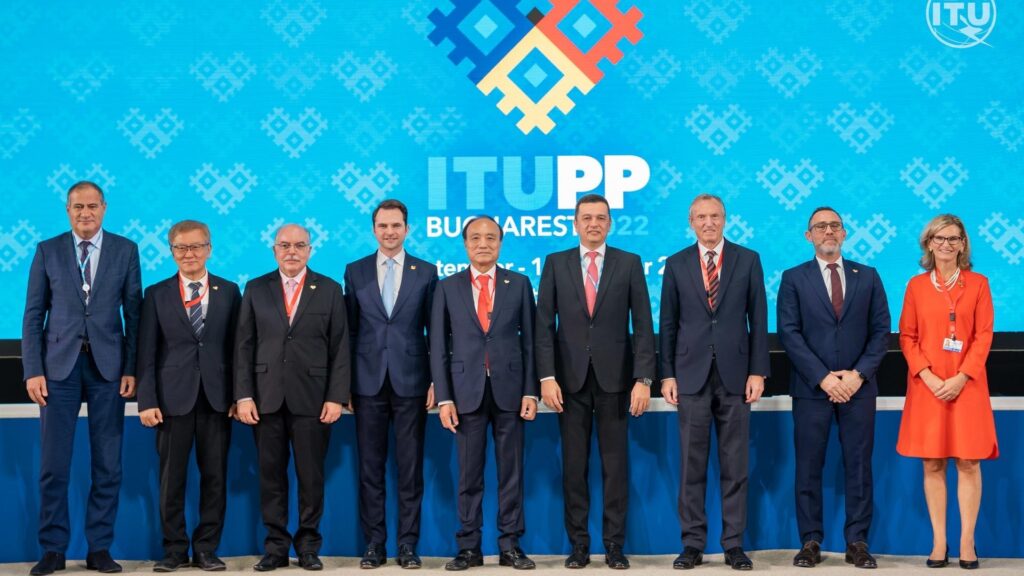

Kick-off
The International Telecommunication Union’s 2022 Plenipotentiary Conference (PP-22) opened on 26 September in Bucharest, Romania. Over 3,000 participants from 193 Member States descended on the Romanian Palace of Parliament to set the Union’s general policies, adopt four-year strategic and financial plans and elect the senior management teams of the organisation, Member States of the Council and members of the Radio Regulations Board.
The Elections
As per custom, the PP-22’s opening week focused primarily on electing the Union’s incoming Secretary General, Deputy Secretary General, Director of Radiocommunications Bureau, Director of the Telecommunications Development Bureau and Director of the Telecommunications Standardization Bureau.
By Monday 03 October 2022, PP-22 had elected:
- Doreen Bogdan-Martin of the United States of America as the next Secretary General of the ITU.
- Bogdan-Martin was elected Secretary-General with 139 votes. Mr. Rashid Ismailov of the Russian Federation received 25 votes.[1]
- Bogdan-Martin is the first woman to hold the post of Secretary-General elect in the Union’s 157-year history.
- Tomas Lamansukas of Lithuania as the next Secretary General of the ITU.
- Lamansukas was elected Deputy Secretary-General with 105 votes. Dr. Chaeusb Lee of the Republic of Korea received 59 votes and Ms. Gisa Futai Purcell of Samoa received 12 Votes.
- Lamansukas is the youngest Deputy Secretary-General-elect in the 157-year history of the Union.
- Mario Maniewicz of Uruguay as the Director of the ITU’s Radiocommunication Bureau with 174 votes (RB).[3]
- Maniewicz continues in his role as Director of ITU-R for a second term.
- Seizo Onoe of Japan as the ITU’s Director of the Telecommunications Standardization Bureau (TSB).
- Onoe was elected TSB Director with 93 Votes. Bilel Jamoussi of Tunisia received 65 votes and Thomas Zielke of Germany received 21 votes.[4]
- Cosmas Zavazava of Zimbabwe as the Director of the ITU’s Telecommunications Development Bureau (BDT).
- Zavazava was elected BDT Director with 101 Votes, while Stephen Bereaux of the Bahamas received 63 votes.[5]
Other Notables
PP-22 also elected members of the Radio Regulations Board (RRB). The RRB is composed of a group of experts who, among other things, consider reports of unresolved interference investigations carried out by the Bureau at the request of one or more administrations and formulates recommendations:
- Region A: Americas (2 seats) – Ms. Chauntel Bauemier (Canada) & Mr. Agostinho Linhares De Souza Filho (Brazil)
- Region B: Western Europe (2 seats) – Mr. Yvon Henri (France) & Mr. Mauro Di Crescenzo (Italy)
- Region C: Eastern Europe and Northern Asia (2 seats) – Ms. Sahiba Hasanova (Azerbaijan) & Mr. Rizat Nurshabekov (Kazakhstan)
- Region D: Africa (3 seats) – Dr. El Sayed Azzouz (Egypt), Mr. Hassan Talib (Morocco) & Mr. Edmund Fianko (Ghana)
- Region E: Asia and Austrasia (3 seats) – Ms. Revathi Mannepalli (India), Mr. Majed Alkahtani (Saudi Arabia) & Mr. Juanjun Cheng (China)
And Member States of the Council:
- Region A (9 seats) – Argentina, Brazil, Mexico, Bahamas, Canada, Cuba, United States, Paraguay, El Salvador
- Region B (8 seats) – Italy, United Kingdom, Sweden, Switzerland, Spain, France, Germany, Turkiye
- Region C (5 seats) – Romania, Azerbaijan, Poland, Bulgaria, Czech Republic
- Region D (13 seats) – Kenya, Ghana, Egypt, Tanzania, Algeria, Morocco, Senegal, Nigeria, Tunisia, Mauritius, Rwanda, Rwanda, Uganda, South Africa
- Region E (13 seats) – UAE, India, Indonesia, Thailand, Malaysia, Japan, Kuwait, Philippines, Saudi Arabia, Australia, Korea (rep. of), Bahrain, China
- The Council acts as the supreme decision-making body of the Union in between two plenipotentiary conferences. It’s composed of 48 Member States
Finally, discussions on a set of important public policy issues started, including Internet governance, space sustainability, networks, disaster communications, cybersecurity, AI, OTTs and standardisations, with ad-hoc groups formed. These groups are expected to continue their work through weeks two and three of the conference.
This is the first of a three-article series covering PP-22. If you wish to learn more about PP-22 and its proceedings, please contact [email protected].
